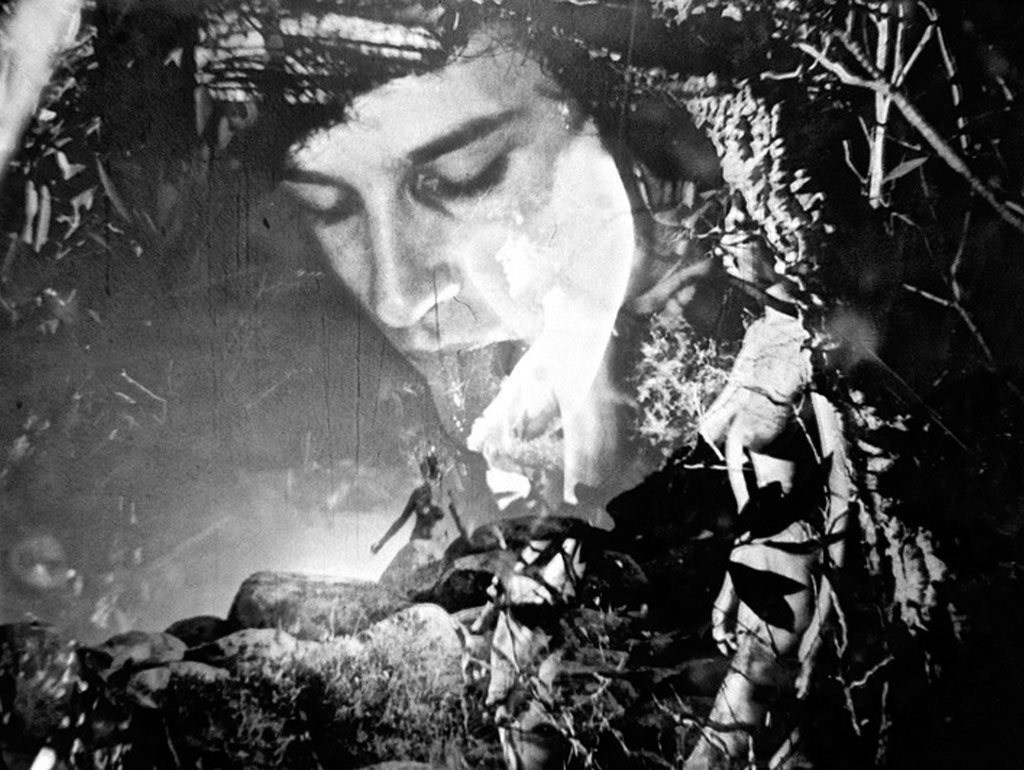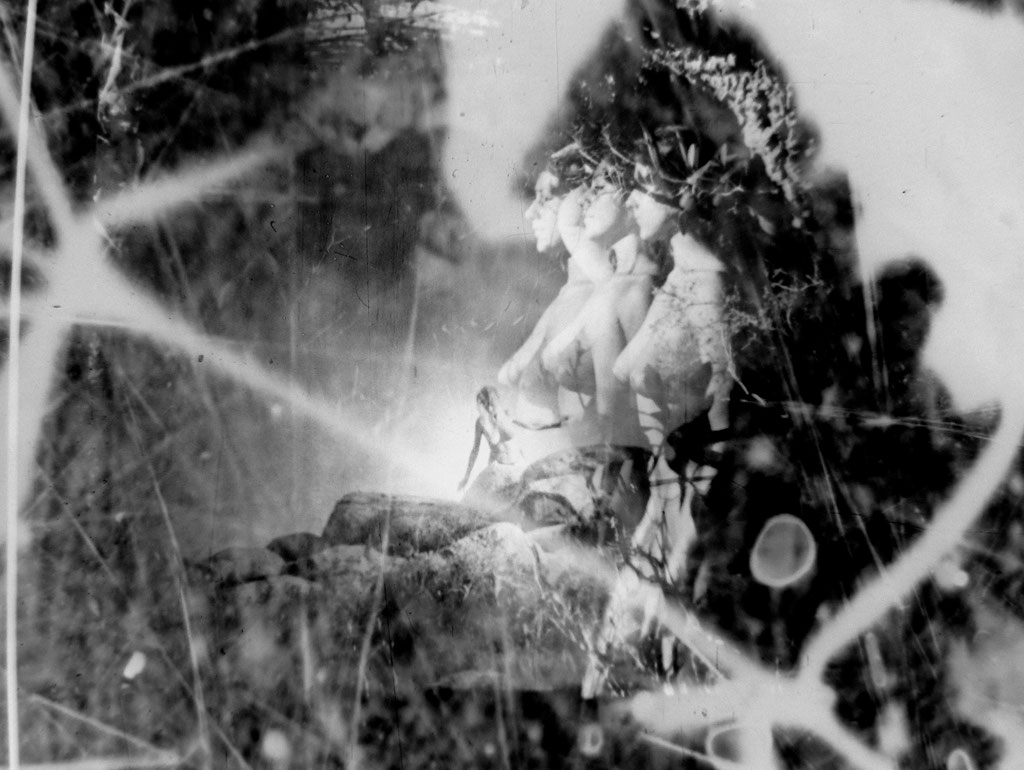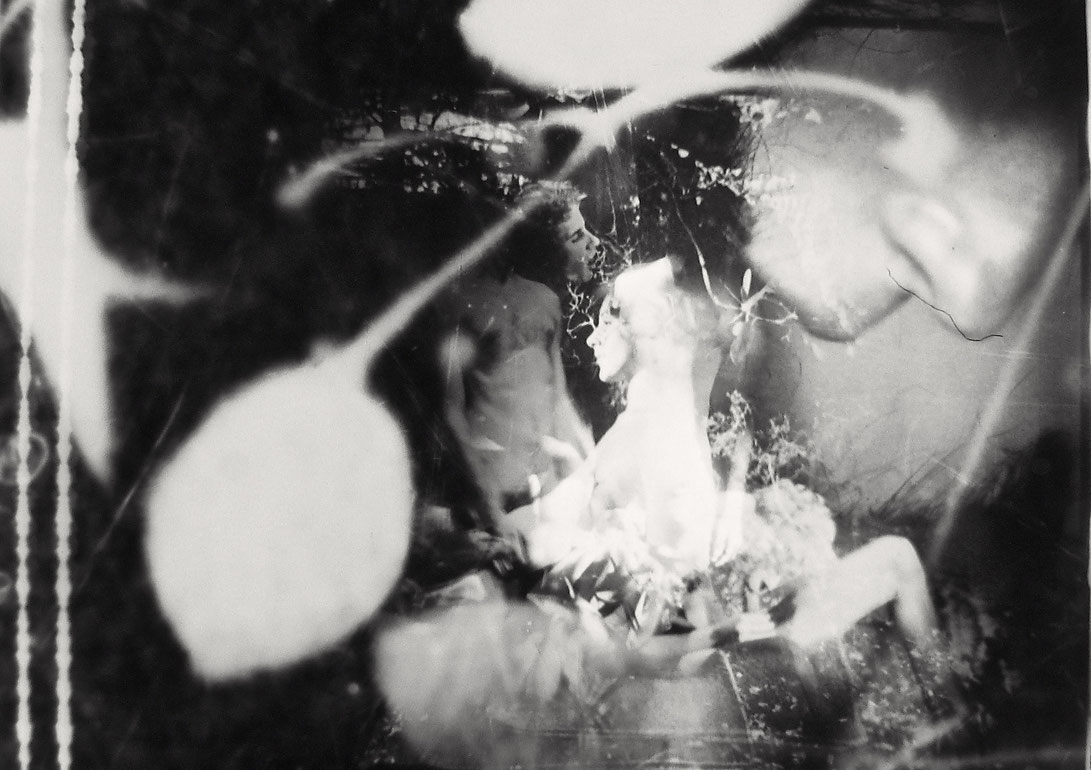The Exquisite Corpus
It is with deceptive simplicity that Peter Tscherkassky embarks on his filmic voyage to regions of desire found in sexualized cinema: A naked couple from a 1960s nudist film climbs aboard a small sailboat, gliding over darkly tinged waters alongside a rocky coastline before stumbling on an isolated beach where a sleeping beauty lays. It takes nearly four minutes to arrive at this juncture, before Tscherkassky blows his fuses in characteristic style. Images begin to flicker and tremble, intermingling and superimposing, nervously shimmering between positive and negative, diving headlong into over-, under-, and multiple exposures, split screens and distortion effects. The title of The Exquisite Corpus not only refers to the Surrealist method of art making called Cadavre Exquis, but also tips its hat to the colloquial German term for a fine funeral or "schöne Leiche" – photochemical cinema is almost an anachronism in this day and age.
Tscherkassky´s is a rigorously analog film, manually composed one frame at a time out of moments from disembodied feature films, amateur and porn flics, as well as fragments of discarded advertising rushes – magic from the garbage can of commercial film. Dirk Schaefer interweaves an original hypnotic melody with ambient sounds, dislocated motifs from legendary exotica composer Les Baxter, Musique concrète, manipulated voices and quotes from Teiji Ito´s famous score for Maya Deren´s Meshes of the Afternoon. A subversive humor seeps into Tscherkassky’s multifaceted use of visual styles and formal play, only heightening the gentle ecstasy of voyeuristic curiosity, desire and seduction fantasy the film invokes. The Exquisite Corpus is a trance film that cunningly magnetizes animal sensuousness, a wet daydream composed of faces, bodies, weavings – tactile and textile: it is an erotic simulation game. (Stefan Grissemann)
In 1925 Surrealists in Paris started to use a writing and drawing technique they called “Cadavre exquis”, which translates as “The Exquisite Corpse”. That technique engages several participants to blindly collaborate in the creation of a single unified image or sentence: One person would write a word or draw part of a body on a piece of paper, fold it over and pass it on to a next participant who would add another piece without seeing what had come before, hand it over to the next person, and so on. The result was a highly synthetic sentence or picture, a composition in the original sense of the word: joined elements, sourced from different origins.
The name of this technique was taken from one of the first sentences it produced: "Le cadavre exquis boira le vin nouveau," – "The exquisite corpse shall drink the new wine."
While I derived most of my films near exclusively from a single found footage source, The Exquisite Corpus is based on several different films, referencing the surrealist “exquisite corpse” technique. You´ll find several rushes from commercials, an American erotic thriller from the 1980s, a British comedy from the 1960s, a Danish as well as a French porn film (both most likely from the 1970s), an Italian soft-core sex movie from 1979, and a (British?) amateur movie – it could be considered a “nudist film” since there are no explicit sex scenes but all the actors run around naked, for no immediately obvious reason.
I mainly focused on these erotic films; they are related in that each tells a completely insane story that is entirely irrelevant but achieves the main goal of showing naked human bodies. I play on this attitude by raising the body of film itself to the forefront, which thereby becomes the central theme of The Exquisite Corpus.
The Exquisite Corpus begins with a search of a seashore. We glimpse a few actors from the prow of a small boat. Gradually what we are seeking is found, a sleeping beauty lies on the beach, right before our eyes. Suddenly and quite unexpectedly, we are drawn into her dream. It´s a highly ambiguous dream – sensuous, humorous, gruesome, and ecstatic – a broadly defined seduction lusting after a tangible, perceptible, exquisite physicality – including the body of the film.
In addition to the aforementioned found footage, many indexical signs and images are imprinted upon the film: photograms of natural origin, like leaves and flower buds, as well as cultural products like meshes and crochet samples. This network of indexical signs (also known as “rayographs”, from Man Ray´s darkroom experiments) not only reveal a very specific way of shaping and sculpting analog film, they also create an organic flair on screen, into which the photographic, iconic signs (which also constantly switch between a constructed cultural interior and nature scenes) are embedded.
Written words and letters pop up in the midst of these pictures, referencing printed as well as hand writing – and echoing “iconic” (printed) and “indexical” (imprinted) systems.
These diverse sources serve as a basis for The Exquisite Corpus, giving rise to heterogeneities I willingly accepted in the spirit of the surrealist technique of the “cadavre exquis”. At the same time the title of the film refers to the “exquisite corpse” which analog cinema nowadays represents: an exquisite corpus but stamped with an expiration date. The exact date remains unknown, but it is foreseeable. (Peter Tscherkassky)
Cannes 2015 by Daniel Kasman
Written by Daniel Kasman
Published on 25 May 2015
https://mubi.com/notebook/posts/cannes-2015-day-10
Trying to capture global trends in contemporary filmmaking by drawing thematic connections between films at the same festival has long been a hackneyed technique that little understands the variable pathways it takes for a film to get made and eventually programmed alongside another. Once one knows more of the tortuous route most filmmakers follow to finish their work and get it shown, the tendrils of affinity or dissonance snaking between theatres and screenings at a festival feel less like a glimpse of the zeitgeist and more the electric charge of coincidence—or fate.
Such was the case in Cannes this year, where two films seemed to meet in a sensual, overlapping dream of flesh, caresses and orgasms. The first dream was formalist extremist Gaspar Noé´s follow-up his untoppable Enter the Void (2009), a new provocation de jour: a 3D sex film. Or, to be more precise, a 3D relationship drama profoundly rooted in the importance sex (unsimulated between his actors) in relationships. Navigating a tuxedoed and high-heeled, rudely fevered and pushily eager crowd at the midnight premiere of Love that eventually started at 1am and ended after 3, the effort and exhaustion required to be provoked did not leave me in a generous mood for this plodding, wooden drama, repetitious and juvenile, yet imbued with an admirable degree of gentleness and affection. I thought, at the time, my patience for any sex in the cinema had been drained completely. But what I hadn´t counted on was that the end of the festival, down the boulevard in an incongruous short film program at the Directors´ Fortnight, projected in a significantly more skeezy cinema than the Grand Théâtre Lumière, though shown at a sunny mid-day time slot far less conducive for sexual-cinematic immersion, I would encounter a far different and better sex film: Austrian avant-garde master Peter Tscherkassky´s The Exquisite Corpus.
I mention Love and The Exquisite Corpus together not to take a glib swipe at Noé´s film, but rather because encountering Tscherkassky´s—a collage of different soft-core, black and white films from the ranging from the 1960s - 1980s named after the surrealist practice of conjoining unconnected things to create uneasy fusions and fission—suddenly made the act of watching these two sex films back to back feel completely fitting. Both structure their stories much in the same way, Love starting with a young man in bed with the mother of his child and flashing back to this his tumultuous recent love life, and The Exquisite Corpus beginning with a nudist couple sailing to a nudist island and finding a girl—nude—asleep or unconscious on the beach, and what follows is her dream. In this cynical and supposedly sophisticated era, where pornography is ubiquitous with access to the Internet, with an image culture that dissipates the charge of photographic nudity, and, in the art film world, where the "audacity," no longer really audacious, of integrating pornographic tropes like unsimulated sex into films is not uncommon; perhaps in this era filmmakers now need such subjective framing devices to properly perfume the sex for the audience with an aura of irreality. We can´t just be shown explicit sex, or drama that includes explicit sex, as these are every day discoveries; we must be led into a world that tells us that while the sex may be real, it is also a fantasy, a memory, a dream—it is something that, outside of your own mind, only cinema itself can magically conjure.
I don´t think Gaspar Noé quite understands what throwing his film into his clod-headed hero´s memories implies or what it allows him to do as a storyteller. Love´s flashbacks are more about a structural interest in relationships and their plotting through time, as in Noé´s Irreversible (2002), rather than what leaving behind "real" time can free a character, a mindstate, a body or a film to do, a freedom his last movie, Enter the Void takes to the max. The Exquisite Corpus, as befits its name, absolutely has this freedom, and it feels it; while Love´s texture is viscously silken, as if we´re stuck in an aquarium of translucent jelly, this 19-minute short, after its prologue arrival on the nudist island, flies into skittering subjective freedom. It moves from clip to clip of soft-core—a forced come-hither smile, a man´s hand caressing a woman´s thighs, the unbuttoning of a fly—and subjects them to Tscherkassky´s characteristic, mad (film-) laboratory manipulations of film stock, radically altering the original footage and/or exposing and playing with its celluloid itself, so in the frame you see multiple strips of the same clip playing in sync, or out of sync—or otherwise treated to maximize the texture of the image and the tactility of film´s movement.
What this does is make the viewing experience haptic, or nearly so; you feel this film, it has not only a physical quality that pulses from the screen but its fitful energy makes this tangibility aggressive and insistent. Depending on the director´s subject, this unique sensation can carry different connotations; Outer Space (1999), for example, finds a link between the assaulting quality of this style on the audience with how Tscherkassky´s manipulations of footage from a horror film seem to also be attacking the film´s heroine, an immersive double onslaught. The Exquisite Corpus is closer to Instructions for a Light and Sound Machine (2005), whose Spaghetti Western source material makes the director´s meticulous, musical manipulations more of a direct cinephilic pleasure. In The Exquisite Corpus, the micro narratives of watching, teasing, touching, fucking and cumming are stories we´re familiar with, and so the play with them, their accentuation, the rhymes or narrative links between footage, their action´s prolongation, the heightened anticipation, all of this carries a more wry edge, downright coy in spots and always a thrill.
Suffice to say, while Love clearly assumes it is being profound, audacious, and heartfelt, The Exquisite Corpus sees the humor and perversion inherent in filming sex—not to mention turning sex or the reason why people are having sex into a story—and dives deep into this world, capturing at once its ridiculousness and the visceral effect it can have, the verve and tantalization it can contain. Tscherkassky is not so much highlighting and excerpting precious bits of soft-core like Godard might quote a lovely gesture from an old film, but rather The Exquisite Corpus pulls at, provokes, and challenges the material these choice moments are made of—quite literally—and finds in their material the ability to express something akin to a super-condensed, supercharged version of their original purpose, all without betraying their woe-begotten cultural value. Suffice to say, I exited the theatre and left Cannes with my faith in sex films restored.
Night Award / Signes de Nuit Bangkok / Jury-statement (Award)
The Night Award honors films, which are able to balance ambiguity and complexity characterized by enigmatic mysteriousness and subtleness, which keeps mind and consideration moving.
Jury Statement :
Introduced as an obscene, amoral, shamelessly self-exposed, only except that it had been done since the year of donkey, Tscherkassky´s latest (and finest) piece of collage as a compilation and accumulation of archival of pornography that secretly and privately screened (more or less presumably) in the forties, otherwise modifies and materialisation to the term "underground cinema", since those obliged to be exclusively exhibited in private space. The real valueless of pornographic adult movies, beside the functions in serving sexual male fantasy, but a fulfillment in manifest our rights of freedom even in our private space, once it´d been regarded as pervert,in our times, those rediscovery of vintage archival of adult movies not only becomes a history, but a fine material to be represented as experimental film. Tscherkassky uses the same techniques that fashionable in the era of avant-gardist experimentalism that tempting
us almost to believe if it had been done by any of those
contemporaries of Man Ray, or Marcel Duchamps.
Night Award / Signes de Nuit Bangkok / Jury-statement



